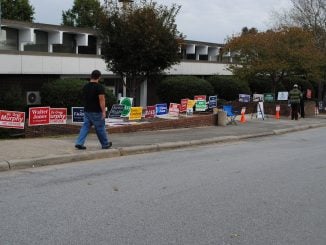
RALEIGH — Multiple General Assembly races and a state Supreme Court race have come in with under a 1% margin separating candidates and are headed to a recount.
“Recounts are a regular part of the elections process when contests are close, and they help ensure that the results are accurate and that the public can have confidence that the candidate who received the most votes wins the election,” Karen Brinson Bell, executive director of the North Carolina State Board of Elections, said in a statement. “Recounts are conducted by bipartisan teams and are open to the public whenever and wherever they occur.”
Most of the state’s 100 counties will begin recounts on Nov. 20. All recounts were expected to be completed no later than Nov. 27, per the N.C. State Board of Elections.
The House seat recounts could have big stakes: Should any of those races land back on the Republican side of the aisle, the party will retain its supermajority in that chamber.
House District 32
Incumbent Frank Sossamon, a Republican, has requested a recount. His opponent, Democrat Bryan Cohn, leads Sossamon with just 233 votes.
House District 25
Democrat Lorenza Wilkins requested a recount after incumbent Republican Rep. Allen Chesser won the race by 461 votes.
House District 105
Democrat challenger Nicole Sidman has requested a recount in the Mecklenburg County House seat race that was retained by Republican Tricia Cotham in the unofficial results. With the final canvas for that seat complete, Cotham leads Sidman by 216 votes, 27,303 to 27,087.
Sidman released a statement on her campaign’s Facebook page saying she had requested a recount, stating in part that the “process is designed to maintain faith in our democratic system of government.”
Cotham made waves in 2023 when she left the Democratic Party and joined the Republicans, giving the GOP a one-vote supermajority. It has been estimated that Democrats spent more than $1 million trying to flip the seat.
Senate District 18
Republican Ashlee Adams has requested a recount against Democrat Terrence Everitt, who wound up 134 votes ahead after canvas.
Senate District 42
Republican Stacie McGinn has requested a recount in the race against Democrat Woodson Bradley. Following canvas, Bradley leads McGinn by 204 votes.
Supreme Court race
The nearly 10,000-vote lead held by Republican Court of Appeals Judge Jefferson Griffin has evaporated. Democrat Associate Justice Allison Riggs, an appointee of Gov. Roy Cooper, had a 623-ballot lead on Griffin as of the morning of Nov. 19.
Unlike in past Supreme Court races, where provisional ballot totals hovered around 8,200, both candidates have seen the number of ballots surpass the 10,000 mark.
Griffin has officially requested a recount of the race but has not yet responded to a request for comment. He has also filed 300 election protests regarding around 60,000 of the ballots cast in the state’s counties.
The current Supreme Court makeup stands at five Republicans and two Democrats, including Riggs. If a recount goes to Griffin, the court will shift to a 6-1 majority.
The recount is not the only action in the Supreme Court race. The North Carolina Republican Party (NCGOP) and Griffin and his campaign filed a lawsuit against the N.C. State Board of Elections (NCSBE).
The lawsuit claims the NCSBE has failed to produce documents and data related to the Supreme Court contest that were requested starting Nov. 5. The lawsuit says some information has been received but that data supplied from county boards of elections shows the NCSBE record production is incomplete.
“The State Board of Elections has not earned any benefit of the doubt regarding their actions and their slow walking of critical information against increasingly tighter time frames illustrates why this lawsuit was filed,” NCGOP Chairman Jason Simmons said in a statement. “We will keep all options available as needed to ensure their compliance with state law.”
The lawsuit says there are four outstanding requests:
• Suspected cases where voters have cast both absentee ballots and in-person ballots
• Voters who used curbside voting on Election Day
• Full lists of felony convictions, along with the datasets and guidance given to local county boards of election on the treatment of votes cast by convicted felons
• Full lists of deceased voters, as well as the datasets and guidance sent to local county boards of election on how to handle ballots of deceased persons
The lawsuit asks for the courts to compel the NCSBE to produce the requested information as well as asking for attorney costs and court fees. In addition to the lawsuit, the NCGOP has filed for a temporary restraining order asking the courts to expedite the review of the case to compel the NCSBE to produce the records.
North State Journal reached out to the NCSBE for comment on the lawsuit and is awaiting a response.
On Nov. 19, Griffin announced via an NCGOP press release that he was filing election protests “challenging the validity of more than 60,000 ballots across the state.”
“As North Carolinians, we cherish our democratic process. Protecting election integrity is not just an option — it’s our duty,” Griffin said in the press release. “These protests are about one fundamental principle: ensuring every legal vote is counted.”
Per the press release, the protests “highlight specific irregularities and discrepancies in the handling and counting of ballots, raising concerns about adherence to established election laws.”



